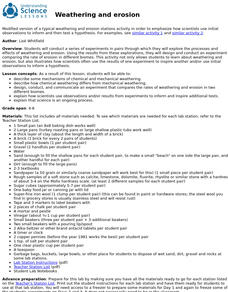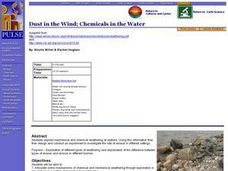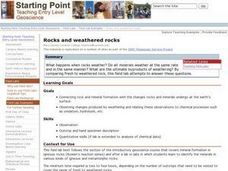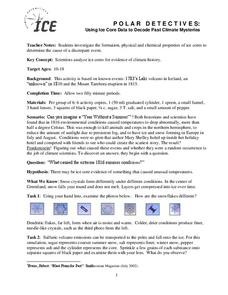PBS
Breaking it Down
After challenging themselves to correctly choose the form of erosion and length of time required for a given landform to develop, earth science class members model mechanical and chemical weathering with various lab demonstrations over...
Curated OER
Weathering and Erosion
Students examine the similarities and differences between weathering and erosion. They participate in a lab in which they test the effects of different materials when exposed to weathering and erosion. They record their observations.
University of California
Weathering and Erosion
Just how powerful is erosion? Interested scientists learn how to identify the results of erosion with a series of lab activities. They move through stations to experiment with different types of erosion and then design and complete their...
Curated OER
Dust in the Wind; Chemicals in the Water
Students explore mechanical and chemical weathering at stations. They articulate some mechanisms of chemical and mechanical weathering through exploration in a lab. Students stations describe how chemical weathering differs from...
Curated OER
Rocks and weathered rocks
Students connect rock and mineral formation with the changes rocks and minerals undergo at the earth's surface. They observe changes produced by weathering and relating these observations to chemical processes such as oxidation,...
Curated OER
Degradation and Weathering of Polymeric Materials
Students investigate issues of degradation and weathering of polymeric materials during their useful life. They evaluate photodegradable plastics and their viability as an environmental solution for litter and investigate the qualitative...
Polar Trec
Polar Detectives: Using Ice Core Data to Decode Past Climate Mysteries
How does examining an ice core tell us about weather? Learners set up and explore fake ice cores made of sugar, salt, and ash to represent historical snowfall and volcanic eruptions. From their setups, scholars determine what caused the...
American Chemical Society
From Gas to Liquid to Solid
From gas to liquid condensation to solid frost, water undergoes phase changes before students' eyes! Using ice, salt, water, and a metal can, they set up an investigation that can be used in a physical science setting, or as part of a...
Texas State University
Earth: Deposition and Lithification
Geology geniuses analyze sediment samples with a hand lens and sort according to physical characteristics. They also learn about the processes of cementation, compaction, and lithification within the rock cycle. The lesson plan is...
Maryland Department of Natural Resources
Eyes on Dissolved Oxygen
Learn about the factors that affect the way oxygen dissolves in salt water with a chemistry lab. After studying the molecular structure of water, young scientists figure out how aeration, temperature, and organic waste affect dissolved...
Curated OER
Lesson 1 - What Are Fossils?
Students define and research fossils. In this fossil lesson, students access teacher assigned Internet sites to examine images of fossils. They determine the definition of a fossil and find out how fossils are formed. They also define a...
Curated OER
Carbon Dioxide
Students conduct a series of experiments to explore carbon dioxide properties. In this chemistry lesson, students explain the production and uses of this gas. They measure its amount in soda and waste product of yeast.













